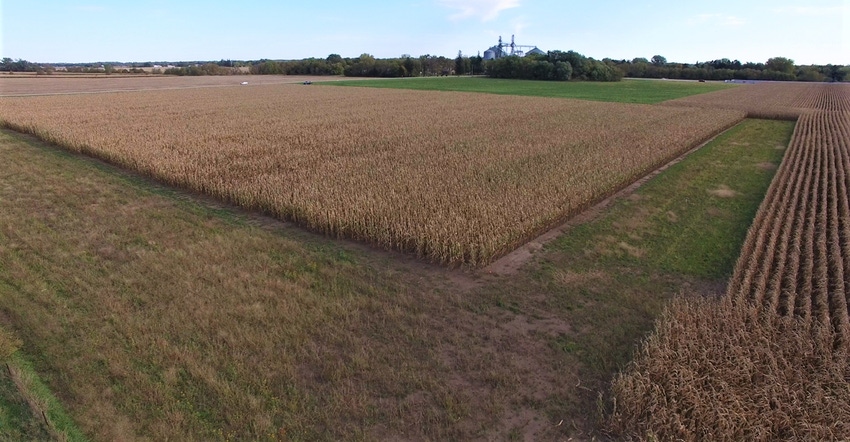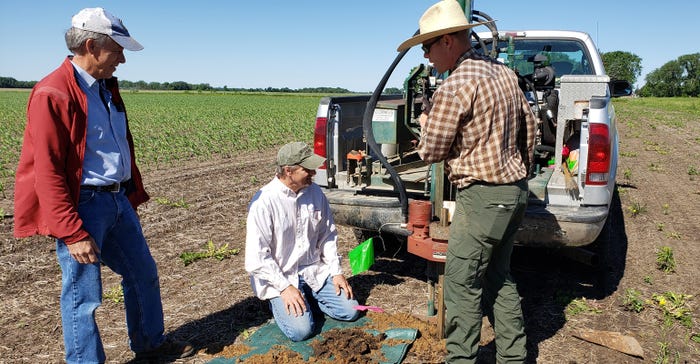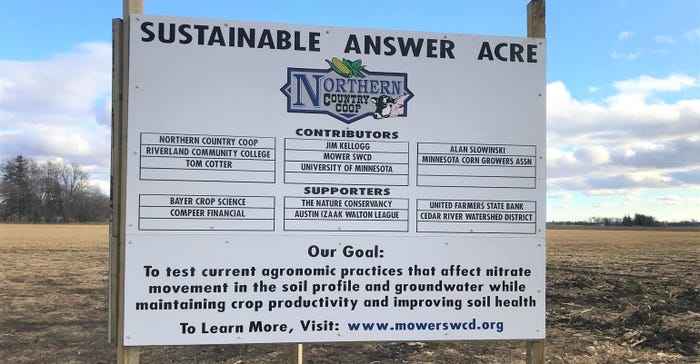March 18, 2020

Innovative, farmer-led research on the economic and environmental effects of applying nitrogen to cropland will continue this year in Mower County, thanks to $50,000 in new grants.
The Minnesota Corn Growers Association and The Nature Conservancy have approved grants to support the Sustainable Answer Acre (SAA) research project initiated by Mower County farmers last year on cropland in Lansing Township.
The Mower County Soil and Water Conservation District is coordinating the project with Northern Country Coop, a farmer-owned, local cooperative that has six of its 12 sites in Mower County and about 1,500 members, including nine who serve on its board of directors that supports the research.
“We’re trying to come up with solutions for our growers that are sustainable and economical,” says Jeff Irvin, regional manager for Northern Country, which is based in Stacyville, Iowa.
 TESTING FOR N: Steve Lawler (left), certified soil scientist for the Mower County Soil and Water Conservation District, works with a crew in June 2019 to drill one of 60 wells at the Sustainable Answer Acre site to sample groundwater for nitrate levels. The research site is sponsored by the Minnesota Corn Growers Association and The Nature Conservancy.
TESTING FOR N: Steve Lawler (left), certified soil scientist for the Mower County Soil and Water Conservation District, works with a crew in June 2019 to drill one of 60 wells at the Sustainable Answer Acre site to sample groundwater for nitrate levels. The research site is sponsored by the Minnesota Corn Growers Association and The Nature Conservancy.

The SAA site includes 8 acres along Mower County Road 2 on an overall 80-acre parcel owned and rented out by Northern Country, which operates a grain elevator across the road in the Village of Lansing. Corn was grown on the 8 acres in 2019, and soybeans are planned for this year at the site, which drains to the Cedar River.
Under SAA, the team aims to test current agronomic practices that affect nitrate movement in the soil profile and groundwater while maintaining crop productivity and improving soil health by disturbing the soil less and growing cover crops, according to Steve Lawler, certified soil scientist for Mower SWCD.
“Our hope is to gain a better understanding on farming practices that benefit both the environmental and the economics of a farm operation,” Lawler says.
For the second-straight year, the Minnesota Corn Growers Association is providing a $30,000 grant through its Minnesota Corn Research & Promotion Council to the SAA project. The association’s $30,000 grant in 2019 helped launch the research, which included Mower SWCD drilling 60 wells (each 10 to 12 feet deep).
The Nature Conservancy, a global, environmental nonprofit that has an office in Minneapolis, is giving $20,000 for use over the next one to two years for the SAA research.
Area farmers led the launch of the SAA project, including Mower County farmers Tom Cotter and Jim Kellogg, who is also a board member for Mower SWCD and Northern Country. Alan Slowinski, who farms the SAA site, is also a contributor to the project.
Riverland Community College, another contributor, has used the SAA site as a “teaching laboratory” for the college’s agricultural sciences courses, including “Introduction to Soil Science.” Local high school ag classes also might use the site.
In the coming weeks, the SAA team led by Lawler will collect the first of seven samples from the site’s wells for nitrate testing. Summer soil sampling will include physical and biological testing.
University of Minnesota’s Office for Soil Health will provide students and faculty this summer to support the SAA research by doing biological testing and studying surface-water infiltration. University of Minnesota also will assist Mower SWCD with two other soil-health research projects this year.
SAA is one of three soil health research projects planned for 2020 by Mower SWCD staff, with all three involving students and faculty from the University of Minnesota. Lawler is overseeing the research and soil sampling with all the soil-health projects.
One of those projects is the third and final year of research funded by a $98,000 grant from The Hormel Foundation to study the effects of cover crops on dozens of plots representing different types of Mower County farmland. Researchers are quantifying typical soil properties in ag before land-use changes to measure varied conditions.
 RESEARCH PARTNERS: A sign posted in late 2019 at the Sustainable Answer Acre site along Mower County Road 2 highlights the project and its contributors and supporters.
RESEARCH PARTNERS: A sign posted in late 2019 at the Sustainable Answer Acre site along Mower County Road 2 highlights the project and its contributors and supporters.

The work has involved partnering with Riverland for use of its soils lab in Austin.
All these efforts are part of a soil-health initiative started 2015 by Mower SWCD when it hired Lawler, who has more than 30 years of applied soil science in the field. In a previous role, Lawler produced a soil survey of Mower County in the 1980s.
Interest in cover crops and other soil-health practices have increased in Minnesota but many local farmers want more data and science before changing practices.
One soil-health practice is cover cropping, which involves planting a second, unharvested crop in coordination with regular cash crops, such as corn and soybeans. Other soil-health practices include only tilling strips on a field before planting — a type of minimum tillage — and no tilling to reduce erosion.
Visit Mower SWCD online more information on the Sustainable Answer Acre research.
Source: Mower SWCD, which is solely responsible for the information provided and is wholly owned by the source. Informa Business Media and all its subsidiaries are not responsible for any of the content contained in this information asset.
You May Also Like




